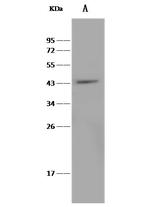Search Thermo Fisher Scientific
Invitrogen
CD264 (TRAIL-R4) Recombinant Rabbit Monoclonal Antibody (201)
FIGURE: 1 / 1
CD264 (TRAIL-R4) Antibody (MA5-29609) in WB

Product Details
MA5-29609
Species Reactivity
Host/Isotype
Expression System
Class
Type
Clone
Immunogen
Conjugate
Form
Purification
Storage buffer
Contains
Storage conditions
Shipping conditions
RRID
Product Specific Information
This product is preservative free. It is recommended to add sodium azide to avoid contamination (final concentration 0.05%-0.1%).
Recombinant rabbit monoclonal antibodies are produced using in vitro expression systems. The expression systems are developed by cloning in the specific antibody DNA sequences from immunoreactive rabbits. Then, individual clones are screened to select the best candidates for production. The advantages of using recombinant rabbit monoclonal antibodies include: better specificity and sensitivity, lot-to-lot consistency, animal origin-free formulations, and broader immunoreactivity to diverse targets due to larger rabbit immune repertoire.
This antibody has specificity for Human TRAIL R4/CD264/TNFRSF10D.
Target Information
TRAIL (also known as Apo-2L) is a member of the tumor necrosis factor (TNF) ligand family that rapidly induces apoptosis in a variety of transformed cell lines. A fourth member of the emerging TRAIL receptor family, TRAIL-R4, has signaling capacity similar to that of TRAIL-R1 and TRAIL-R2 with respect to NF-kappaB activation, but differs in its inability to induce apoptosis. Like TRAIL-R1 and TRAIL-R2, this receptor shows widespread tissue expression. The human TRAIL-R4 gene has been mapped to chromosome 8p22-21, clustered with three other TRAIL receptors.
For Research Use Only. Not for use in diagnostic procedures. Not for resale without express authorization.
References (0)
Bioinformatics
Protein Aliases: CD264; DcR2; Decoy receptor 2; TNF receptor-related receptor for TRAIL; TNF-related apoptosis-inducing ligand receptor 4; TRAIL receptor 4; TRAIL receptor with a truncated death domain; Tumor necrosis factor receptor superfamily member 10D; tumor necrosis factor receptor superfamily member 10d, decoy with truncated death domain; tumor necrosis factor receptor superfamily, member 10d, decoy with truncated death domain
Gene Aliases: CD264; DCR2; TNFRSF10D; TRAIL-R4; TRAILR4; TRUNDD; UNQ251/PRO288
UniProt ID: (Human) Q9UBN6
Entrez Gene ID: (Human) 8793

Performance Guarantee
If an Invitrogen™ antibody doesn't perform as described on our website or datasheet,we'll replace the product at no cost to you, or provide you with a credit for a future purchase.*
Learn more
We're here to help
Get expert recommendations for common problems or connect directly with an on staff expert for technical assistance related to applications, equipment and general product use.
Contact tech support
